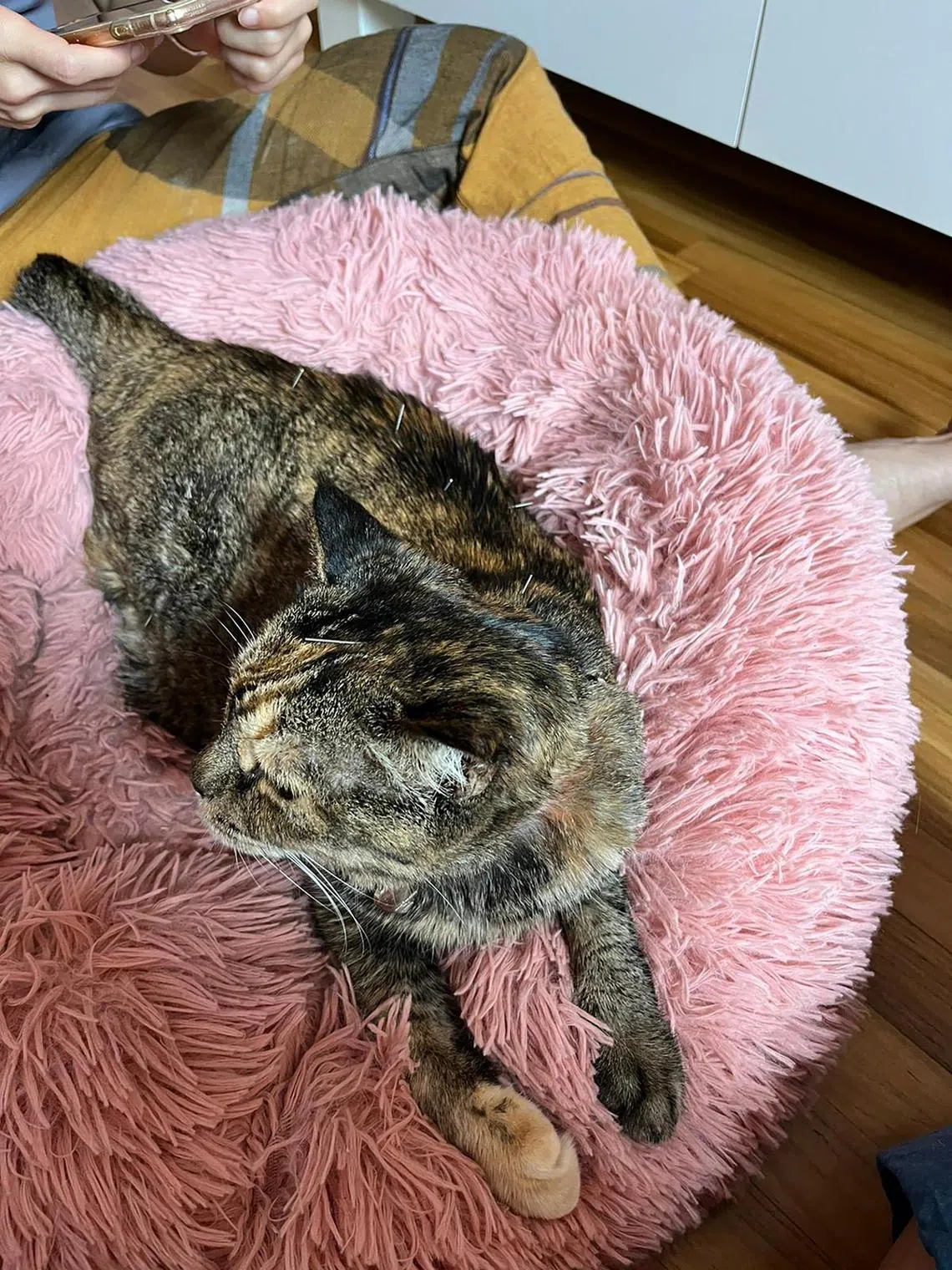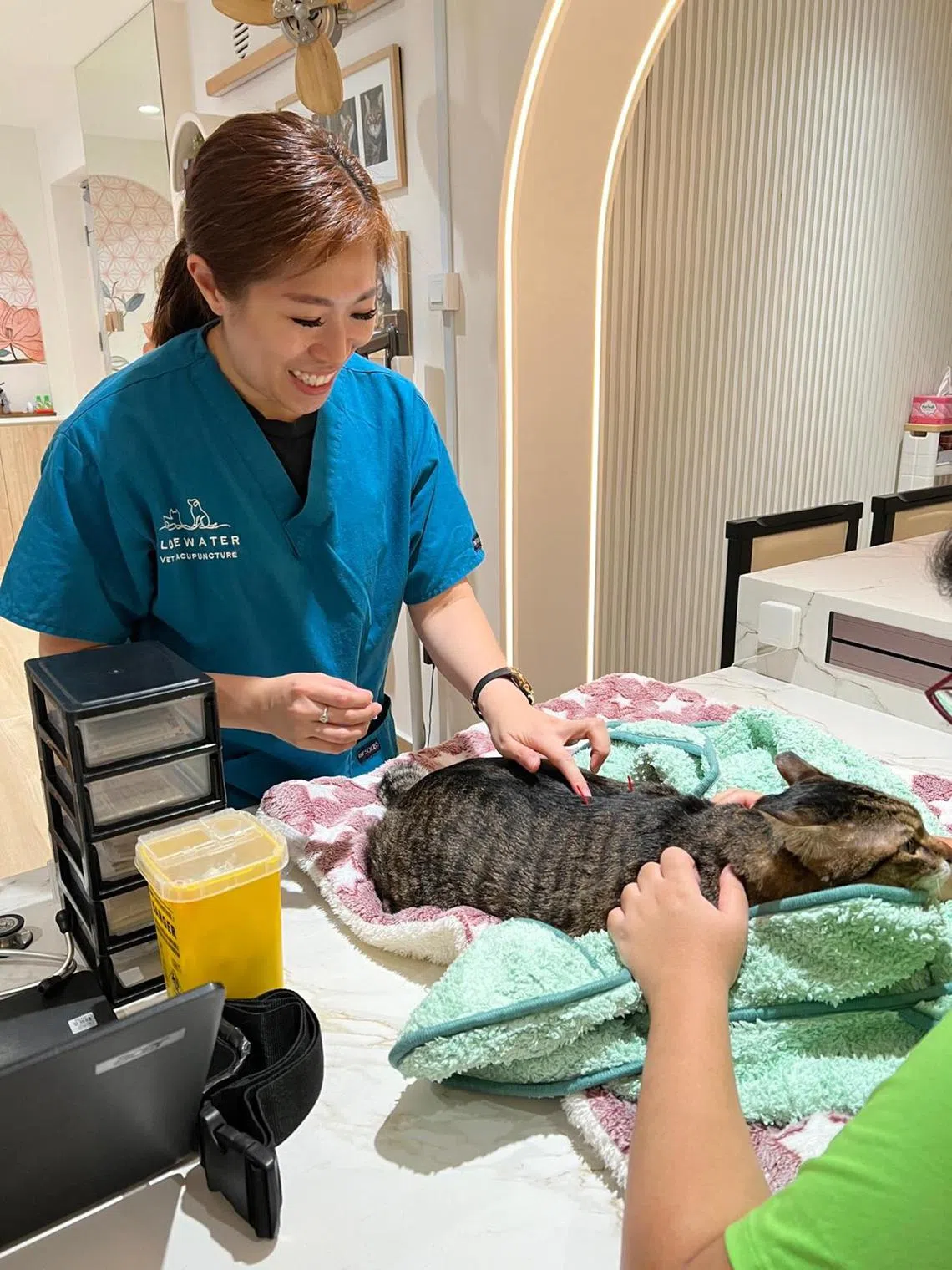Acupuncture supports pets suffering from chronic pain, beneficial for senior pets
Sign up now: Get ST's newsletters delivered to your inbox

Blessie, a maltipoo, being treated for her back injury by Dr Nicholas Haw at Bluewater Vet Acupuncture & Rehabilitation.
PHOTOS: KAREN YUEN
SINGAPORE – A fight over food between Ms Karen Yuen’s two dogs – Mello, a bichon poodle, and Blessie, a maltipoo – resulted in Blessie injuring her back severely.
Since that altercation at the start of 2024, Blessie lost mobility in her limbs and could not relieve herself.
Suspecting Blessie was suffering from intervertebral disc disease (IVDD), Ms Yuen was at a loss regarding treatment, as a spinal surgery could put her senior fur kid at risk of death.
IVDD is an age-related, degenerative condition that involves the spinal cord, the vertebrae, or backbones, and the disc material between each vertebra.
“Blessie was already 13 years old and she also had issues with her heart,” Ms Yuen, 50, says.
The realtor chanced upon pet acupuncture, which was recommended by her pet-sitter. Though she was initially sceptical about such treatments, she decided to give it a shot, as Blessie could rely only on painkillers to relieve her pain.
To Ms Yuen’s surprise, Blessie’s condition improved after her second acupuncture session with Dr Nicholas Haw at Bluewater Vet Acupuncture & Rehabilitation.
However, after a month of treatment, the pooch fell off her pram and aggravated her back injury. “Blessie is now going for monthly maintenance sessions and has recovered almost completely,” says Ms Yuen.
Dr Haw says pet acupuncture is a complementary veterinary treatment in which thin, sterile needles are inserted into specific points on an animal’s body.
“It is often used alongside conventional veterinary medicine and physical rehabilitation therapies, offering a holistic approach to managing various health conditions,” he adds.
According to Dr Haw, acupuncture can support pets suffering from chronic pain, arthritis, neurological disorders and post-surgical recovery. It is also beneficial for senior pets or those with underlying conditions such as liver or kidney disease, in which owners seek safe, non-invasive treatment options.
Pumpkin, a 13-year-old domestic shorthair cat, was diagnosed with inflammatory bowel disease (IBD) in 2020 and her owner, who wants to be known as Ms Aliza, wanted a non-invasive and holistic treatment. IBD is a condition where a cat’s gastrointestinal tract becomes chronically irritated and inflamed.
“Pumpkin was already on supplements and medication for her kidney problem and Western medicine could only prevent the IBD symptoms,” says Ms Aliza, 54, a civil servant.
She sought the help of Dr Angeline Yang, a certified vet acupuncturist and co-owner of VetMobile SG.

Pumpkin, who suffered from inflammatory bowel disease, underwent acupuncture treatment by Dr Angeline Yang.
PHOTO: ALIZA
Pumpkin’s condition stabilised after a year of acupuncture. She also had monthly follow-ups with Dr Yang for about four years.
In 2024, Pumpkin died from kidney failure.
While pet acupuncture has been practised in Singapore for at least eight years, it is still a niche treatment. Only licensed veterinarians can offer such services here. It is also not to be seen as a “miracle” cure.
Pet acupuncture works through both traditional Chinese medicine (TCM) principles and modern scientific mechanisms, says Dr Haw.
“Acupuncture focuses on balancing the flow of energy, or qi, within the body through pathways known as meridian channels. Blockages or imbalances in these channels are thought to cause illness or discomfort. By stimulating specific acupuncture points, the body’s natural balance is restored, promoting healing and wellness,” he adds.
Some physiological effects of acupuncture include the release of endorphins, nerve stimulation and the improvement of blood flow.
While animal acupuncture is considered one of the safest forms of treatment because it stimulates the body’s natural healing mechanisms and does not involve the use of drugs, there may be occasional side effects, says Dr Haw.
For instance, the pet may experience soreness or stiffness for up to 48 hours or it may be lethargic for up to 24 hours.
Dr Haw says pet owners who have experienced the benefits of TCM are often keen to explore the option for their pets.
Ms Junaiza Junid sought acupuncture for her cat Logan, who was diagnosed with feline leukaemia virus (Felv+) – an infectious retrovirus that affects a cat’s immune system – in 2023. Logan, then eight years old, also showed early signs of chronic kidney disease.
In 2024, Logan’s vet, Dr Geetha Nellinathan from The Cat Vet, performed a lumpectomy to remove three lumps from his spine and under his arms. But lumps reappeared after the surgery, so Ms Junaiza sought an alternative remedy.
“My husband and daughter use acupuncture to recover from sport injuries, so when we heard about TCM for pets, we decided to try it for Logan,” says the housewife, 53.

Logan is being treated by Dr Dawn Wong from Bluewater Vet Acupuncture & Rehabilitation.
PHOTO: JUNAIZA JUNID
As Logan’s ailment is contagious, Dr Dawn Wong from Bluewater Vet Acupuncture & Rehabilitation treated him at home. Although the tabby initially disliked being pricked, he eventually took to the needles so well, he would doze off during treatments.
According to Ms Junaiza, there were no more detectable lumps by the sixth acupuncture session. “Logan became more agile and nimble. There is also a visible increase in energy and naughtiness,” she adds.
Logan is still under the care of Dr Wong and Dr Nellinathan, who put him on RetroMad1 for Felv+ and Furment RenaCor for his kidneys.
Keeping Logan healthy does not come cheap. Ms Junaiza says the family spends $1,900 for a package of 10 house-call acupuncture sessions and about $1,500 on Western medicine every six weeks.
“One cannot put a price on saving the life of a family member,” says Ms Junaiza.
Dr Yang says: “Acupuncture should not be the sole treatment, especially for more acute conditions. Strictly surgical conditions such as bone fractures and tumours should see more conventional routes of treatment.
“People often see acupuncture as a last resort. It should be done earlier for better effect.”



